Search
Showing 10 of 1702 results for the cuzzy rolly, latest
-
Intelligence
On this page are links to a number of websites that host
IntelliLab
This is ENZ's intelligence hub for international education providers and hosts the latest information on student numbers and trends, market information, industry valuations, research, and insights on recent developments, to help industry make informed decisions. Home | ENZ IntelliLab
Ministry of Foreign Affairs and Trade Market reports
In these market reports you will find the latest market intelligence from New Zealand's Ministry of Foreign Affairs and Trade. MFAT Market Intelligence Reports | New Zealand Ministry of Foreign Affairs and Trade
New Zealand Trade and Enterprise
On this website, are market guides and events to support businesses with their export journey. NZTE helps New Zealand businesses grow in international markets
-
ENZ Agent Seminars in China make a strong impact for rebuilding connections
China is the largest source of international students for New Zealand with agents being the leading channel for student recruitment in this market. Building strong connections between providers and agents in China is critical to recovering student mobility, improving awareness of New Zealand as a study destination and strengthening New Zealand's market position. ENZ's Agent Seminars in China are a well-recognised and impactful way of building relationships with a range of key agents.
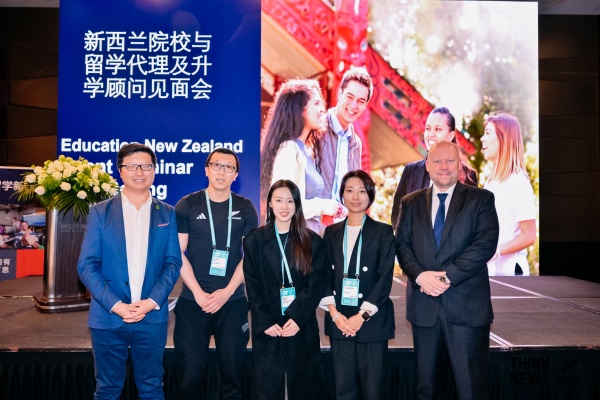
Education Counsellor and ENZ’s Regional Director Greater China, Michael Zhang, (far left) at the Beijing Agent Seminar with representatives from New Oriental Education Agency and H.E. Grahame Morton, New Zealand Ambassador to People’s Republic of China.
In addition, Agent Seminars also help to keep agents informed with the latest official information and is an important tool that Education New Zealand Manapou ki te Ao (ENZ) and other NZ Inc agencies use to share such information. According to recent Immigration New Zealand (INZ) data, agents in China have a high approval rate for student visa processing.
Currently, ENZ runs its Agent Seminar series twice a year in this region and this latest series of events held in Chengdu, Shanghai, Hong Kong and Beijing were supported by the New Zealand Ministry of Foreign Affairs and Trade (MFAT) and INZ. INZ’s China-based representatives gave in-person presentations, an initiative which was well received with 88% of agents reporting its inclusion as “very or extremely important to their attendance” in a post-event survey.
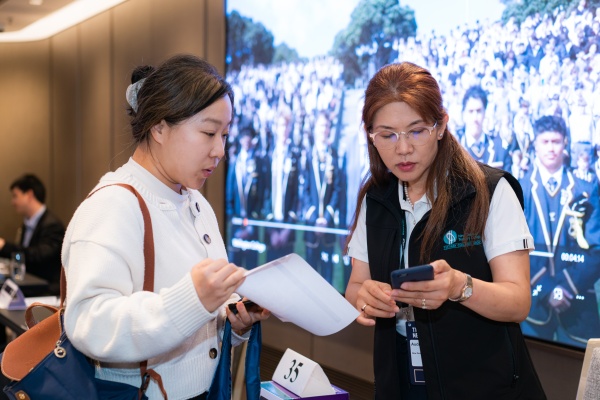
Participants at the Hong Kong Agent Seminar discuss New Zealand education offerings.
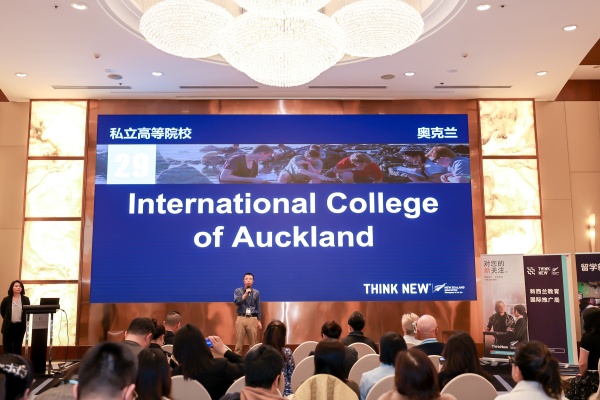
Kevin Wang from the International College of Auckland presenting at the Shanghai Agent Seminar.
To leverage the visibility of New Zealand education providers in the China market, ENZ facilitated media interviews and social media recordings for participants at the Shanghai and Chendgu Seminars. New Zealand providers and ENZ representatives in Chengdu conducted interviews with 13 journalists, the highest response rate for media attending Agent Seminars to date. As a result, three million views were achieved from 58 stories published by 27 local media outlets, with New Zealand university representatives quoted in a media story and an exclusive interview and story for Te Pūkenga on the uniqueness of New Zealand's vocational education in a separate article.
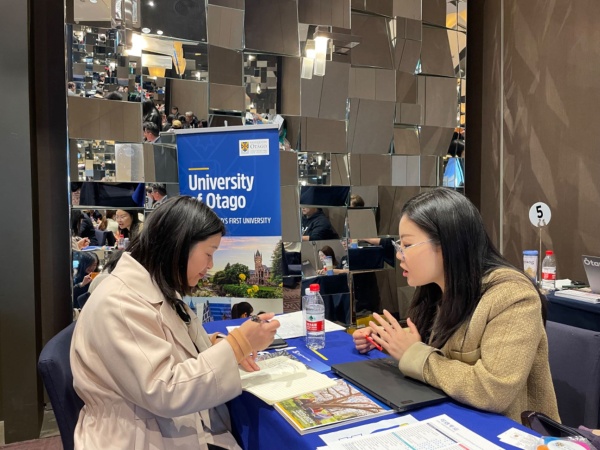
Joyce Zhang, University of Otago, is interviewed by a journalist from local media in Chengdu at the ENZ Agent Seminar.
In Shanghai, the ENZ Shanghai team delivered a China marketing insights session for sector representatives. The presentation titled “Unlocking China’s Education Market: Insights and tools for success” covered:
-
The key drivers of the consumer
-
China’s media/digital/social media landscape
-
The big four – WeChat, Little Red Book, Douyin and Bilibili (case studies included)
-
ENZ’s China local marketing plan.
Anyone interested in receiving a copy of the Marketing Presentation can access this here on ENZ’s Intellilab.
ENZ collaborated with Shinyway, the largest agent in the eastern region of China to produce short videos for the agency to promote online. The online promotion aimed to leverage brand awareness of a New Zealand education showcasing New Zealand providers attending the Shanghai event. A big kudos goes to the 18 brave New Zealand representatives who accepted the invitation to participate in the filming. Education Counsellor and Regional Director Greater China, Michael Zhang, was also interviewed to present the advantages of a New Zealand education and our institutions across all sectors.
Shinyway has published all the videos on their consumer-facing social media platforms, including WeChat, Little Red Book, and Weibo. The collaboration enhances New Zealand providers’ market exposure by leveraging Shinyway's influence across their digital platforms and reaching prospective audiences in China elevating our brand profile within a highly targeted audience group.
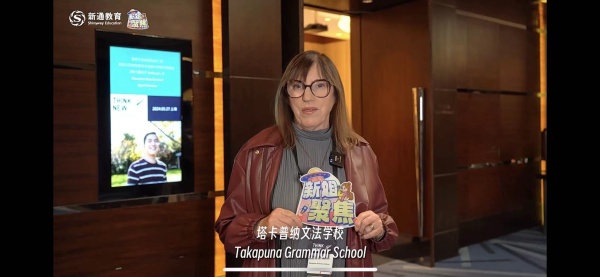
Mary Nixon, Principal of Takapuna Grammar School participating in the recording for sharing on social media. The first trial video published on Shinyway's WeChat received over 300 engagements including likes, shares, favorites and comments.
87.5% of New Zealand education providers also said that “attendance at the seminars was either “very valuable” or “valuable” for their organisation.”
The dates and locations for the next round of Agent Seminars in China will be announced soon. These details will be posted on the ENZ Events page along with the link for registering.
-
-
Latest Immigration New Zealand update: English translations will be required for visitor visa suppor
English translations will be required for visitor visa supporting documents
Immigration New Zealand (INZ) has announced that from 17 June 2024, all supporting documents submitted with visitor visa applications to INZ must be provided in English. This includes visitor visa applications from people wanting to study for less than three months.
For further information on what this means please see the announcement on the INZ website: English translations will be required for visitor visa supporting documents | Immigration New Zealand.
There are no plans at this stage for student visas to follow suit.
-
Around the world in five
Canada
A new report by Statistics Canada has revealed international graduates typically earn less than their Canadian peers and are more likely to work in sales and services industries.
Australia
A new study into the perceptions of immigrants and immigration policy preferences led by The Australian National University (ANU) has found that Australians want less migration but also hold “large and often contradictory misperceptions”. At the same time, support for international students remains steady.
Africa
ICEF Monitor has analysed mobility patterns in East Africa, noting the growing emphasis on arrangements and frameworks that are beneficial for both sending and receiving countries.
United Kingdom
A UK public opinion poll has shown support for international students and for maintaining or increasing current numbers, with most voters not viewing students as migrants.
India
India’s University Grants Commission has introduced several higher education reforms over the last four years in keeping with the National Education Policy 2020.
-
Philippines roadshow showcases New Zealand’s premier ITP and PTE offering
The roadshow showcased the strength and diversity of New Zealand’s Institutes of Technology and Polytechnics (ITP) and Private Training Establishments (PTE) sub-sectors.
The roadshow brought together eleven New Zealand education providers: academyEX, NZSEG, Te Rito Maioha Early Childhood New Zealand, Ara Institute of Canterbury, Eastern Institute of Technology, NMIT, Southern Institute of Technology (SIT), Wintec, Future Skills, Auckland Institute of Studies and Otago Polytechnic.
A wide range of activities were held throughout the two-week programme, which included a media roundtable, agent seminars, school guidance counsellor workshops, and New Zealand Study Fairs.
These engagements helped to deepen education ties and raise awareness of New Zealand’s high-quality, hands-on tertiary education opportunities among Filipino students, parents, agents, and school representatives.
ENZ Market Manager Chortip Pramoolpol, ENZ Regional Director Asia Ben Burrowes and New Zealand Ambassador to the Philippines, H.E. Dr. Catherine McIntosh at the media roundtable in Manilla.
The media roundtable was held in collaboration with the New Zealand Embassy in Manilla and attracted 10 journalists.
The session highlighted the growing number of Filipino students choosing New Zealand and the shared values that underpin our education system – particularly in inclusive learning and vocational, work-ready training.
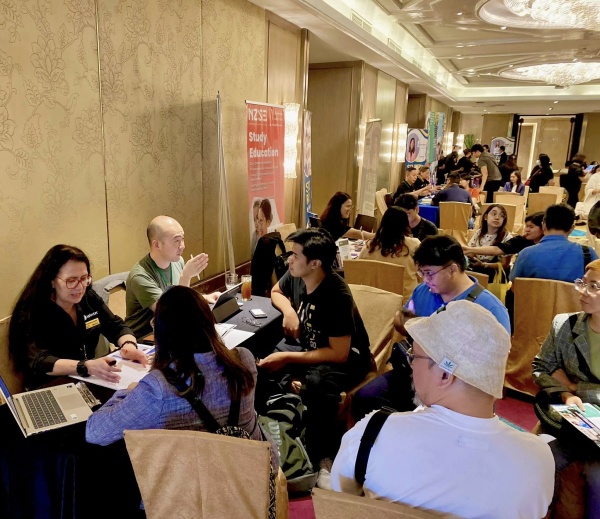
The New Zealand Study Fair in Manila.
The New Zealand Study Fairs across the three cities were buzzing, with 160 attendees in Manila, 165 in Bacolod, and 157 in Cebu.
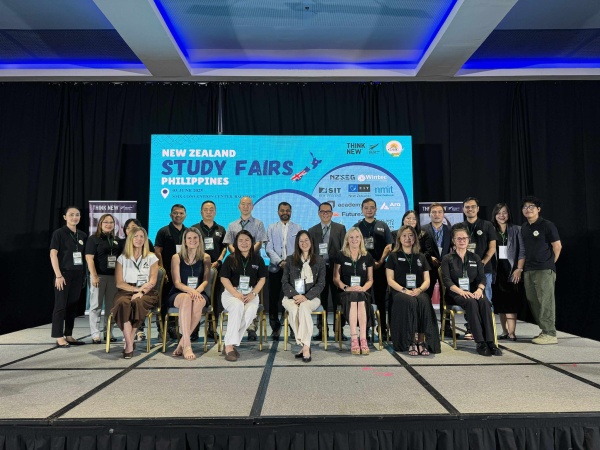
The New Zealand Study Fair in Baclod.

Providers talking to prospective students at the New Zealand Study Fair in Cebu.

Attendees of the Manila agent seminar.
The agent seminars in Manila and Chebu brought together agents who are eager to promote tertiary education in New Zealand to build connections with providers.
ENZ representatives provided a presentation on the latest official information on studying in New Zealand and resources for agents to promote New Zealand education. Immigration New Zealand (INZ) provided a recorded presentation on the latest visa information for the Philippines market.
In Manila, the education agent seminar attracted 37 attendees, while 11 agents participated in Cebu.
School engagement in the roadshow was also notable, with eight schools attending the school guidance counsellor workshop in Manila and 10 in Cebu.
ENZ Regional Director for Asia (excluding China), Ben Burrowes said this roadshow marks another exciting step in strengthening the education relationship between New Zealand and the Philippines.
“The strong turnout across all events and the enthusiastic engagement from agents, students, and school counsellors show there is a growing appetite for the quality education New Zealand offers,” he said.
“We’re proud to support our PTE and ITP partners in connecting with this key market, ENZ looks forward to building on this momentum in the coming months,” Ben added.
-
Around the World in Five
USA
Recognising the need for Americans to improve their international awareness, this article views study abroad as a “solution” to American foreign policy isolation. The article discusses the imbalance between the number of international students who study in the US (975,000) and the number of US students who study overseas (304,000), the Generation Study Abroad initiative that aims to double the number of US students who study abroad (and which ENZ is a signatory to), current US government support of study abroad and ideas around potential policy changes to further support study abroad.
China
During the National People’s Congress (NPC) and Chinese People’s Political Consultative Conference (CPPCC) annual sessions in March 2016 (called the “Lianghui”, or “Two Meetings”), it was identified that skills in the high-end manufacturing industry, the science and technology service industry, IT, the cultural products and creative industries and the finance industry will likely become the most sought-after over the “13th Five-Year Plan” period (2016 – 2020).
Taiwan
The number of Taiwanese people with a college, university or other type of higher education degree has increased to 5 million (42.68 of the population) in 2015, according to the latest statistics released by the Ministry of the Interior (MOI) on Saturday. This is higher than the OECD average.
Brazil
Jose Celso Freire, head of the international office of Sao Paulo State University (UNESP) and also president of the international education association of Brazil, FAUBAI, is optimistic about the future of the Science without Borders scholarship programme. Mr Freire said, “I don’t believe they will just cut the programme, but there’s a huge push that scholarships will be more focused on postgraduate studies.”
Vietnam
Transnational education, study abroad and opportunities for collaboration were all on the agenda at an international education conference on integration in education jointly held last week by the Association of Vietnam Universities and Colleges (AVUC) and the Vietnam International Education Consultants Association (VIECA). Held at the Government Guest House Hanoi, the one-day conference welcomed international education experts from both provider and agent sides of the industry and was attended by more than 200 AVUC members, foreign embassy officials and representatives from several government ministries.
-
Latest levy data released
As many expected, the 2012 figures confirm a decline in international student enrolments since 2011. Although enrolment numbers fell by 6 percent (5,665), the report also shows that tuition fees from international education increased by $13.4 million, up 2 percent.
While these are the headline numbers of the report, a more complete picture is revealed by looking at the report in more detail. For instance, while there has been a 5,665 decrease in enrolments, certain sectors have been impacted more than others. Private Training Enterprises (PTEs), mainly non-funded, experienced a drop in enrolments of 5,102. However, Institutes of Technology and Polytechnics (ITPs) saw a 4 percent increase in enrolments, although the numbers, 434, are modest.
Canterbury is suffering reduced student enrolments due to the earthquakes, an important factor in explaining the national numbers. There were 2,979 fewer students – a 31 percent drop – enrolled with Canterbury education providers in 2012.
The ongoing effects of the rising New Zealand dollar are also hurting the industry, and it is important to note that other providers of international education are experiencing similar trends. Australia, for example, has experienced a similar decline in international student enrolments, with their numbers down by 7 percent in 2012.
We need to improve our understanding of what factors drive student choices in our key markets. To this end, much of Education New Zealand’s current work is focused on how students and their families decide on where to undertake their course of study, and the factors that influence their decision.
This research will allow Education New Zealand to provide you, the industry, with detailed information that is current and relevant. We can then work together to develop programmes and initiatives to increase the demand for what New Zealand has to offer.
There is much work to be done. A willingness to take a different approach is essential if we are to grow our industry.
We will provide more analysis of the data in next week’s edition of our e-news, International Education News. Some of the key information from the report is included below.
Kind regards,

Grant McPherson
Chief Executive Education New Zealand
Enrolments: There was a 6% drop (from 98,660 to 92,995 in international student enrolments) in 2012. The main results were:
-
Schools (down 3%), universities (down 2%), funded PTEs (down 6%), non-funded PTEs (down 13%)
-
Canterbury numbers down 31% (a reduction of 2,979)
-
Chinese enrolments up 5% (now 27% of all international students)
-
Japan (number 4 market in 2012) enrolments up 3%
-
Saudi Arabia (number 5 market) down 26%
-
South Korea (number 3 market) down 19%
-
India has overtaken South Korea as our second biggest source of students
-
ITP enrolments up 4%
Tuition fees: There has been an overall $13.4 million (2%) rise in international education tuition fees in 2012, but the results varied according to sector:
-
Universities (up 6%), ITPs (up 5%) and funded PTEs (up 7%)
-
Schools (down 19%) and non-funded PTEs (down 9%)



-
-
More analysis of latest international student enrolment data

The 2012 Export Education Levy data contained mixed news across sectors, and from some of our key international markets. While the number of international student enrolments is down overall, importantly the value of the industry, as measured by international fees earned, has increased by 2 percent and this is a significant result.
Education New Zealand is committed to working with each sector of New Zealand’s international education industry to support institution’s needs and priorities to enable industry-led growth. We have a strong programme of work underway in 2013 to achieve this.Schools

For all schools, international student numbers declined 0.3% to 15,643 students in 2012 compared with 2011
-
Primary and intermediate enrolments were down 3.3%
-
Secondary, composite and special enrolments fell 0.3%.
-
But value has remained more or less static over the past five years
-
South Korea and China make up half the international education market for this sector
South Korea was down 15% for schools in 2012. Why?
-
South Korean Government moves to provide more English language tuition in Korea
-
Foreign providers setting up in Korea
-
Christchurch earthquake
-
Economic factors in markets
-
High NZ dollar.
China shows strong growth
-
In 2012 there was a 20% increase in Chinese school international student numbers
-
Chinese first-time visa applications are up, particularly for contributing, composite and special schools.
Japan is emerging as a growth market
-
Japanese school international student numbers rose 23% in 2012
-
ENZ regards Japan as a market worth further exploration, particularly for school partnerships.
Universities

Universities earned $308.9 million in international fees in 2012, an increase of 5.5%
-
There are fewer international students, but they are higher value.
International university student numbers fell 5.2% - a decline of 980 students
-
Indian international students accounted for more than 40 percent of the decline.
-
There was a small increase in numbers of Chinese international students (universities’ biggest and most valuable market). This suggests that New Zealand’s most important international education market is performing well
-
Japanese international student numbers almost doubled
-
Saudi numbers are falling due to a halt in new intakes for Saudi scholarship students in 2012
-
Universities have seen overall international student numbers fall since 2004 despite ongoing growth in the global market for international students
-
Capacity exists and there is scope for recovering market share in the university sector.
Figures for individual universities are not yet available but we believe about a quarter of this decline can be attributed to a fall in enrolments at Canterbury and Lincoln Universities due to earthquakes
Universities have strong commitment to internationalisation, partnering with institutions in a variety of markets.
Institutes of Technology and Polytechnics (ITPs)
In 2012 ITP fee income was up 4.9% from 2011 - overall revenue for the sector has increased almost 50% since 2007
International student numbers rose 7.1%; EFTS were up a corresponding 3.4%. ITPs was the only sector to see a rise in numbers and EFTS
India and China make a combined 57.6% of all ITP international enrolments:
-
Numbers are up or holding for all major markets
-
There were small declines in South Korea and Saudi Arabia
-
Saudi numbers are falling due to a halt in new intakes for Saudi scholarship students in 2012
-
China remains relatively strong
-
ITPs are encountering strong competition in India from traditional competitors Canada and Australia
-
ITPs want to diversify their exposure to India and China with new market development in the Middle East, Sri Lanka, Nepal, Indonesia and the Philippines.
Private Training Establishments (PTEs)

PTEs (non-SDR)
Enrolments at non-SDR PTEs (mostly English language schools) fell 13% in 2012
-
English language schools down 17%.
-
Tuition fees were down 9 % to $105.1 million
-
The decline in English language schools likely to be linked to the rising value of the NZ dollar. International language travelers are known to be price sensitive; also an area of intense international competition.
This fall, which has been happening for two years, is of concern because ESOL students often move on to further academic study
Why down:
-
Affordability – the high NZ dollar
-
Greater provision of English language tuition in South Korea
-
Saudi Arabia – fewer new Saudi scholarships
-
New immigration policy – changes to work rights for L5 and 6 diplomas introduced in April 2012
-
Competition from other our key global competitors.
PTEs (SDR)
-
Enrolments at SDR PTEs (mainly vocational education training institutions) were down 6% in 2012
-
Tuition fees were up 6.4% to $99 million
-
Internationally, demand is growing for high quality vocational training
-
Some of our competitors (eg. Australia) have tightened up student immigration criteria for vocational training.
-
-
ENZ’s latest Statement of Intent is out
While the overarching goals and objectives for New Zealand's international education industry remain the same, the strategic framework of our next steps to support the industry to reach these goals are reflected in more detail.
The two intermediate outcomes of these next steps include activities to increase both the economic value of international students studying in New Zealand and increase the economic value of our products and services delivered offshore.
Alongside these marketing and industry development activities, we also support government-government liaison work and will launch our outbound scholarship programme.Download the Statement of Intent 2013-2016.
-
Changes to ENZ in Vietnam
Nga Phuong Tran, who has worked with many in the New Zealand international education industry over the last three years, is again working fulltime for New Zealand Trade and Enterprise (NZTE).
ENZ is in the final stages of appointing a new, fulltime Market Development Manager (MDM) in Ho Chi Minh City (HCMC). Once appointed, the MDM will be responsible for all support and logistics around the education fairs usually provided by ENZ, other recruitment activities as well as helping New Zealand education providers expand their engagement with Vietnam.
Until the new MDM in HCMC is appointed, please direct all enquiries related to Vietnam to the ENZ Regional Director, Izak Human.
When this latest appointment is made, ENZ will have fulltime representatives in Malaysia, Indonesia, Thailand and Vietnam. All of these Southeast Asian regional representatives are able to provide information on:
-
education opportunities in their respective countries;
-
local regulations regarding provision of education services;
-
assistance with finding suitable partner institutions; and
-
how to connect with national education ministries and officials.
ENZ representatives also maintain regular contact with a network of regional education agents and would welcome information on specific programmes or study options that you may want to promote in South East Asia.
Nga’s farewell message is that over the last three years “I have had the privilege of working with over 90 New Zealand education providers from all over New Zealand. I have met with so many memorable and wonderful people from different institutions. Many of you have taken a proactive and innovative approach to promoting New Zealand education in the Vietnamese market – so keep it up!
Thank you for your support and friendship.”
-

